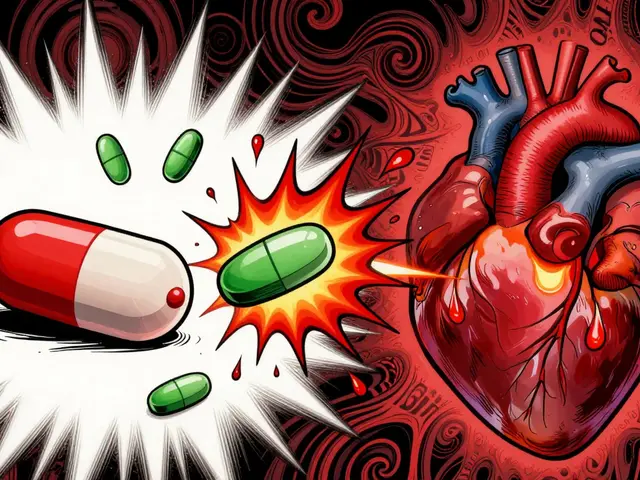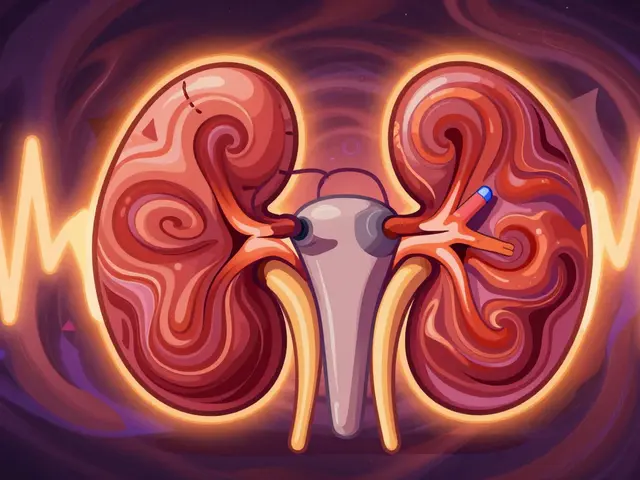
Hypothyroidism: Simple Guide to Symptoms, Treatment & Everyday Tips
Feeling constantly tired, gaining weight without changing your diet, or noticing a sluggish mind? Those are classic signs of a low‑functioning thyroid, known as hypothyroidism. It’s a common condition in the UK, especially among women over 40, and it’s totally manageable with the right knowledge.
First off, what exactly is hypothyroidism? Your thyroid is a tiny, butterfly‑shaped gland in the front of your neck that releases hormones like thyroxine (T4) and triiodothyronine (T3). These hormones control how fast your body uses energy. When the gland doesn’t make enough, metabolism slows, leading to the symptoms you’ll soon recognize.
Spotting the Signs and Getting Diagnosed
Typical symptoms include fatigue, cold intolerance, dry skin, hair loss, muscle aches, and a slowed heart rate. Some people also experience depression or memory fog. If you notice a cluster of these, book an appointment with your GP. The standard test is a blood check for thyroid‑stimulating hormone (TSH); a high TSH usually means your thyroid is under‑active.
Don’t forget to ask about a full thyroid panel, which measures free T4 and sometimes T3. This gives a clearer picture of how much hormone is actually available to your cells. In some cases, doctors may also check for thyroid antibodies to see if an autoimmune condition like Hashimoto’s is the cause.
Managing Hypothyroidism: Medication, Diet & Lifestyle
The cornerstone of treatment is levothyroxine, a synthetic T4 pill taken once daily on an empty stomach. Most people feel better within a few weeks, but it can take a few months to fine‑tune the dose. Your doctor will monitor TSH every 6‑8 weeks until it stabilises in the target range (usually 0.4–4.0 mU/L).
While medication does the heavy lifting, a supportive diet can make a difference. Aim for a balanced plate with lean protein, whole grains, and plenty of fruits and veg. Iodine‑rich foods like fish, dairy, and iodised salt are essential, but avoid over‑doing iodine supplements unless your doctor recommends them.
Some nutrients help the thyroid work better: selenium (found in Brazil nuts, tuna, and eggs) and zinc (in meat, pumpkin seeds, and legumes). A daily multivitamin with these minerals can be a safe boost, but always check with a pharmacist first.
Exercise isn’t a cure, but staying active lifts metabolism and combats weight gain. Even a brisk 30‑minute walk most days can improve energy levels and mood. Pair that with good sleep habits – aim for 7‑9 hours, and keep your bedroom cool and dark.
Stress management matters too. Chronic stress raises cortisol, which can interfere with thyroid hormone conversion. Simple practices like mindful breathing, short yoga sessions, or a hobby you enjoy can keep cortisol in check.
If you’re considering herbal supplements, be cautious. Products like ashwagandha or guggul are marketed for thyroid support, but the evidence is limited and they may interact with levothyroxine. Always run them by a qualified pharmacist or your GP before adding them to your routine.
Finally, keep track of any changes. A symptom diary or a simple notes app can help you spot patterns and discuss them with your doctor during check‑ups. Managing hypothyroidism is a team effort between you, your GP, and your pharmacist – and with the right approach, you can feel like yourself again.
-
6 Sep






